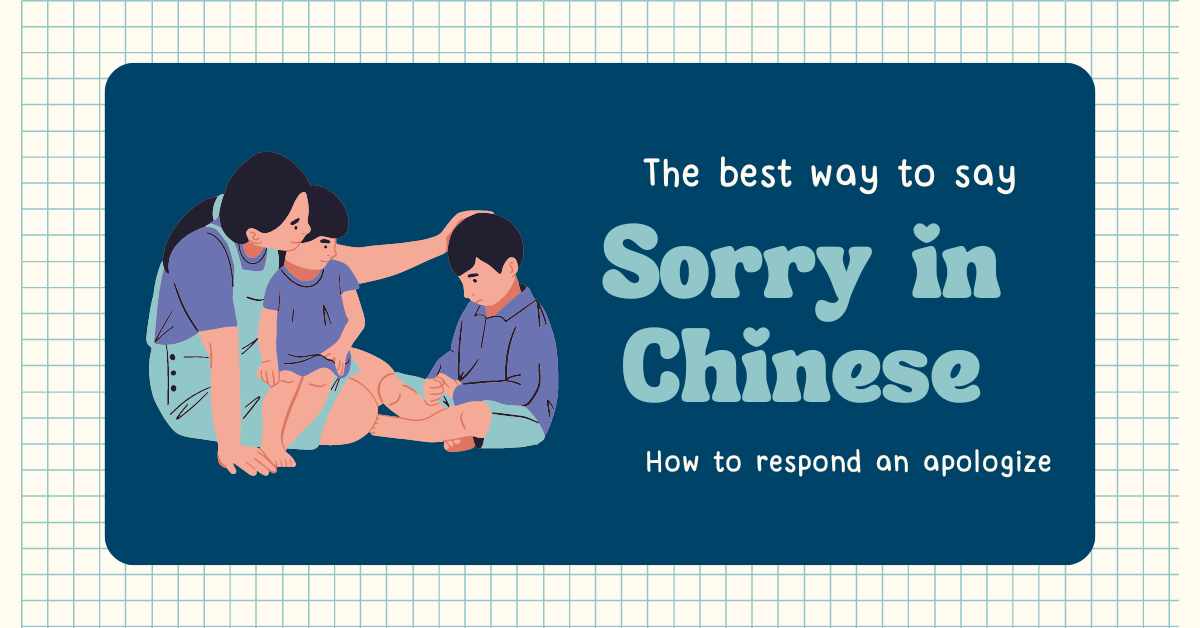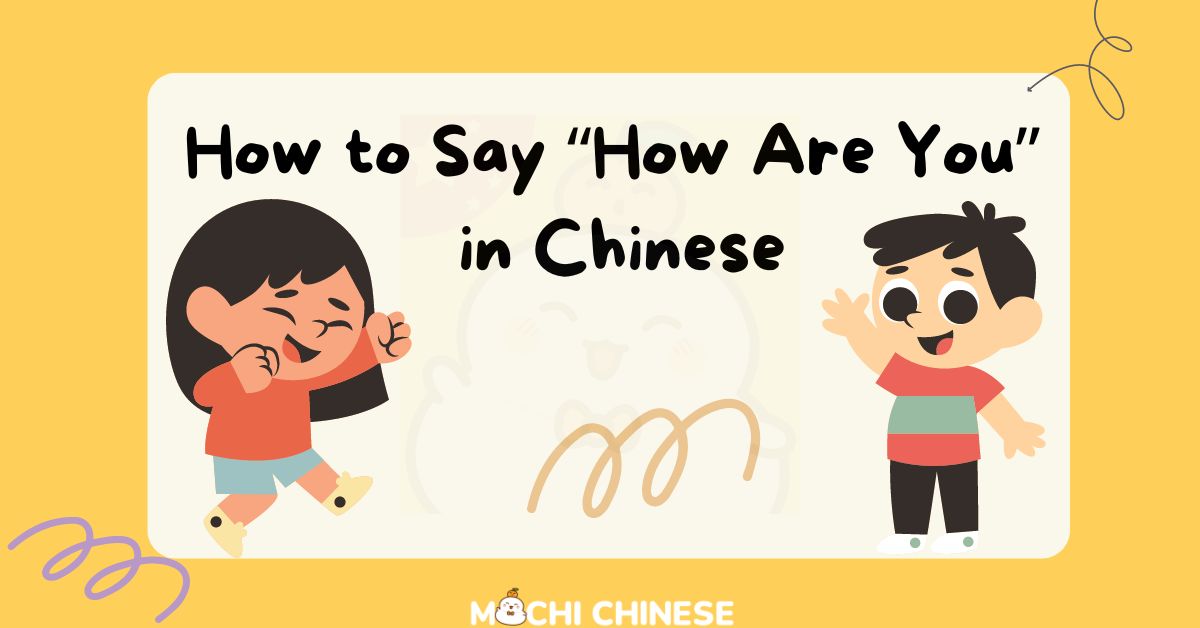Learning a new language is not just about mastering vocabulary and grammar; it’s about understanding the nuances, cultural contexts, and everyday usage that bring the language to life. When it comes to Chinese, one of the most widely spoken languages in the world, this rings especially true.
In this guide, we’ll delve into the various ways to say “shut up” in Chinese, explore the cultural contexts in which these phrases are used, and provide practical advice on when and how to use them appropriately.
Disclaimer: The phrase “shut up” can be quite harsh and offensive, depending on the context. This guide aims to educate on its usage in Chinese to promote better understanding and not to encourage the use of impolite language.
Understanding the Phrase “Shut Up” in Chinese
Direct Translations and Connotations
The most direct translation of “shut up” in Chinese is 闭嘴 (bì zuǐ). This phrase is quite blunt and carries a strong connotation, similar to the English equivalent. It’s important to recognize that, much like in English, using this phrase can be seen as rude and aggressive.
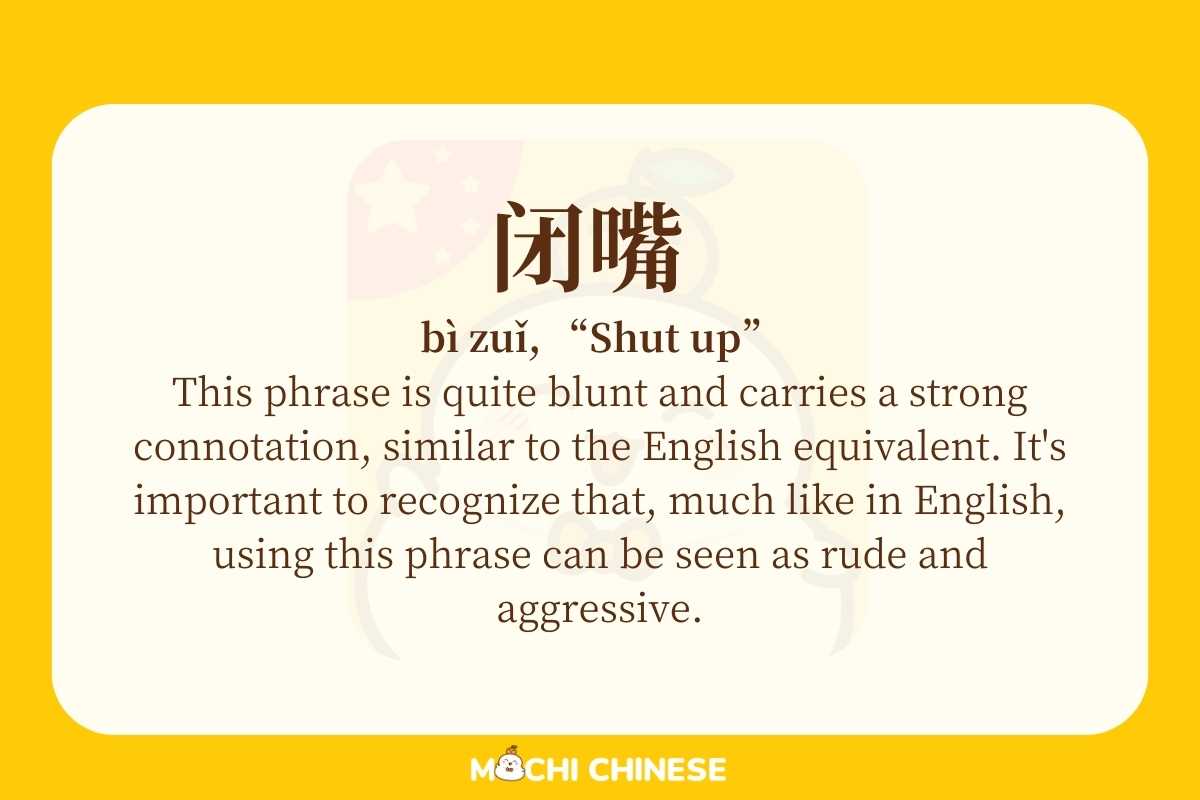
Common Chinese Equivalents of “Shut Up”
Understanding the context in which these phrases are used is key. Here are some examples to illustrate their usage:
- 闭嘴 (bì zuǐ): Often used in arguments or confrontational situations. For example, if someone is interrupting you repeatedly, you might snap and say 闭嘴 (bì zuǐ).
- 住口 (zhù kǒu): Can be used in a similar context but is a bit softer. For instance, a parent might say this to a child who is being particularly noisy.
- 别吵了 (bié chǎo le): Suitable for situations where multiple people are talking loudly and you need some peace and quiet, like in a library or at home.
- 安静 (ānjìng): The most polite option, ideal for asking someone to lower their voice in a public or formal setting.
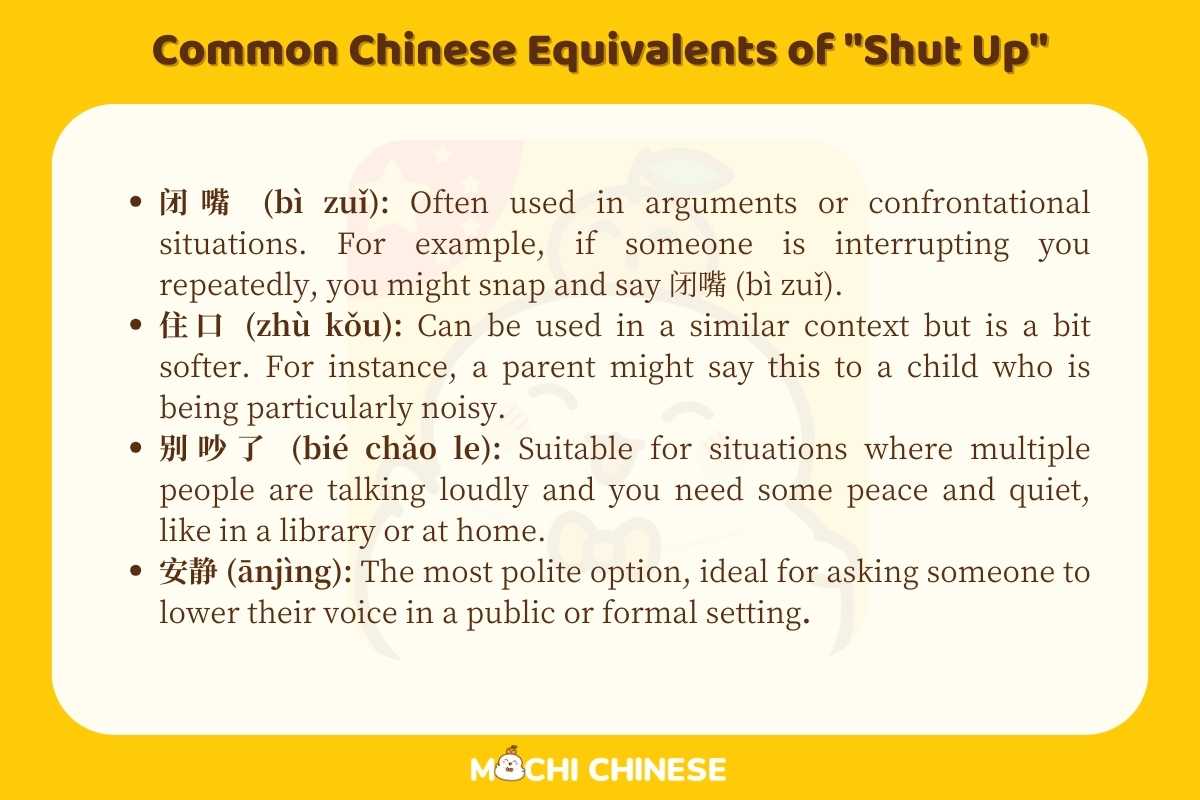
To learn Chinese vocabulary effectively, MochiMochi recommends you use Mochi Chinese app. This app focuses on joyful learning experiences and helps you memorize 1000 Chinese words in just one month. It features a bright and friendly design, interactive lessons, and a special feature called “Golden Time” that reminds you to review vocabulary right before you forget it. You can download it for free from the Google Play Store, App Store, or Web version.

Cultural Context and Appropriateness of saying “Shut up”
Cultural Implications of Using Strong Language in China
Chinese culture places a high value on respect and politeness, especially in public and in interactions with elders or authority figures. Using strong language like “shut up” can be considered highly disrespectful and offensive. It’s crucial to be aware of the cultural context and the potential impact of your words.
When is it Socially Acceptable to Use Phrases Like “Shut Up”?
In general, using phrases like 闭嘴 (bì zuǐ) or 住口 (zhù kǒu) is only socially acceptable in very specific contexts, such as:
- Among close friends or family members where the relationship allows for bluntness.
- In situations of extreme frustration or anger, though this is still not ideal.
- When someone is being dangerously disruptive, and immediate silence is necessary.
The Role of Respect and Politeness in Chinese Culture
Respect and politeness are deeply ingrained in Chinese social interactions. Instead of directly telling someone to “shut up,” it is often more appropriate to use indirect or softer language. Phrases like 请安静 (qǐng ānjìng) or 能不能低声点? (néng bù néng dīshēng diǎn?) are much more aligned with cultural norms and are less likely to offend.
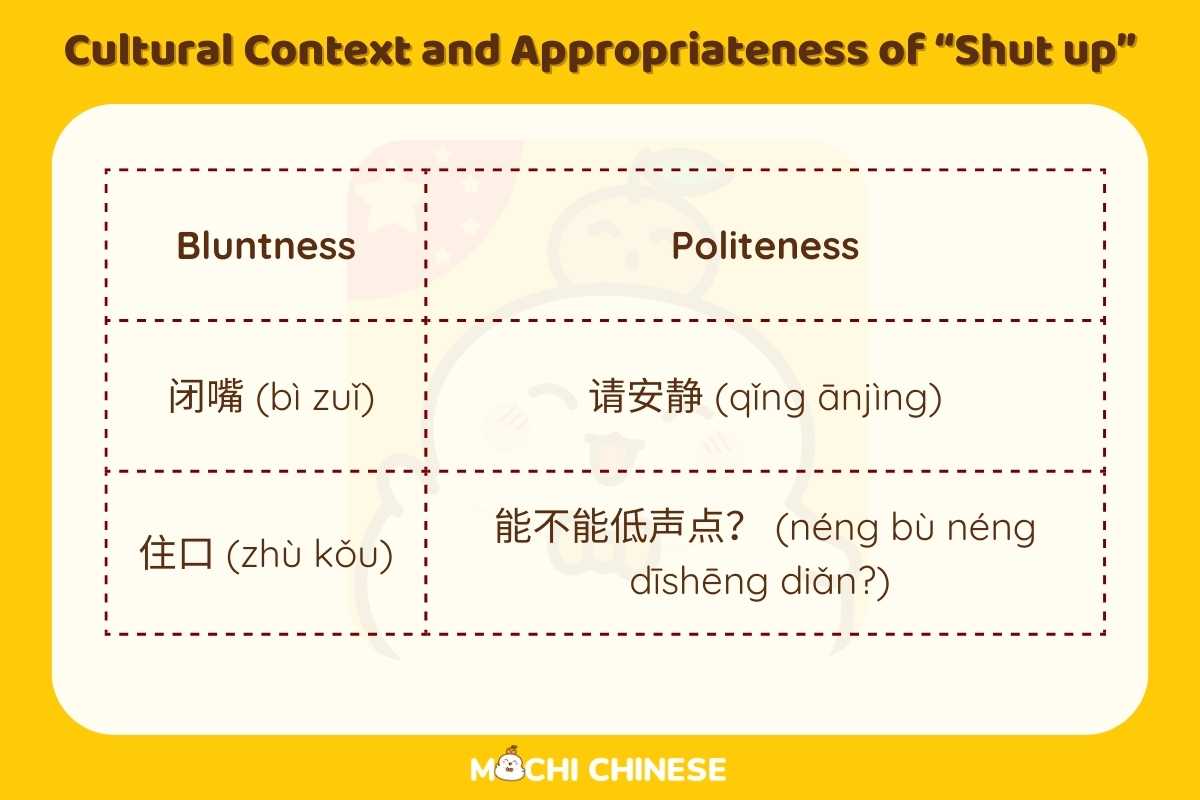
Variations of ” Shut Up” Across Chinese-Speaking Regions
Mandarin and Other Dialects
China is a vast country with numerous dialects and regional languages. While Mandarin (普通话) is the official language, many regions have their own unique ways of saying “shut up.”
Cantonese
In Cantonese, the phrase “shut up” can be expressed as “收聲” (sāu sēng). It’s an impolite way of telling someone to be quiet or stop talking. Feel free to use this phrase when needed!
Shanghainese
In **Shanghainese**, you can say “住口” (zhùkǒu) to mean “shut up” or “be quiet.” It consists of two Chinese characters: “住” (zhù), which means “to cease,” and “口” (kǒu), which means “mouth.” Put the two together, and you get a very effective way to say “Shut your mouth.”
Taiwanese
In Taiwanese Hokkien, another major dialect, “shut up” can be said as 闭嘴 (phái-choeh), reflecting the influence of both Mandarin and local linguistic traditions.
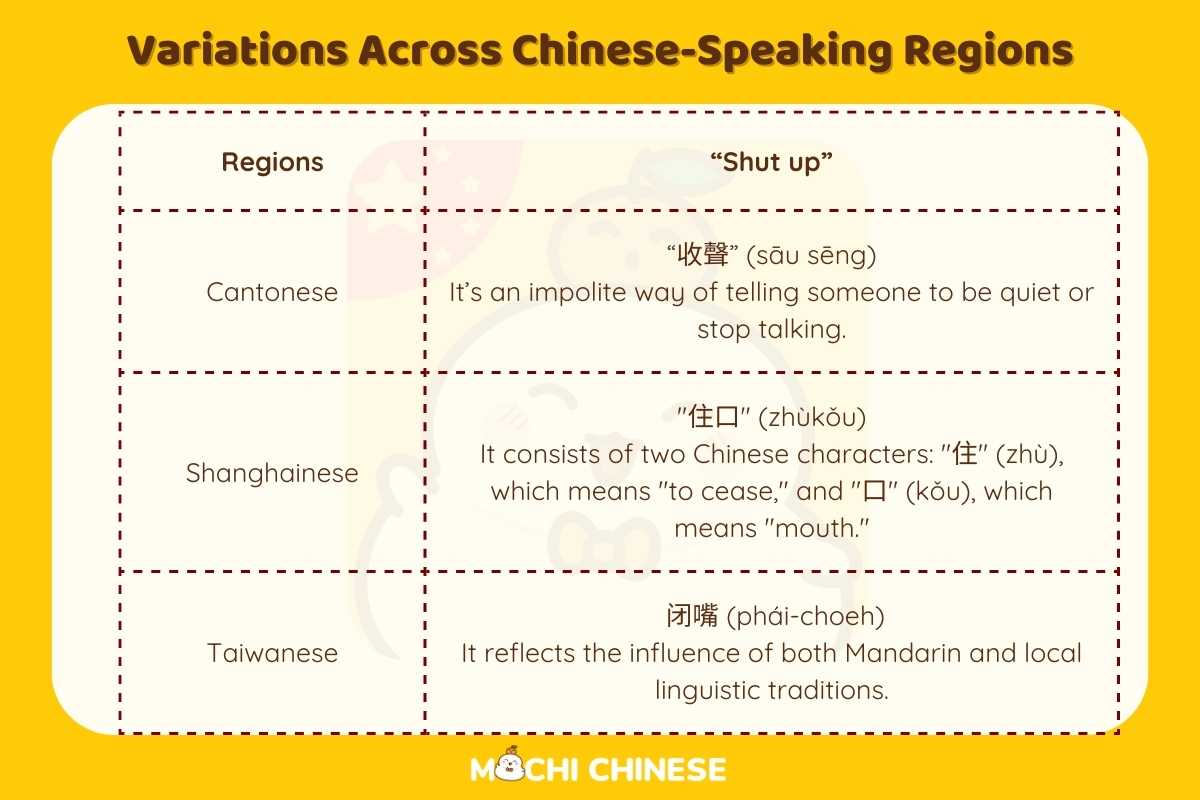
Usage of “Shut up” in Chinese Media
Examples from Chinese Movies and TV Shows
Chinese media, like movies and TV shows, often reflect real-life language use, including colloquial phrases like “shut up.” Observing how these phrases are used in media can provide valuable context and help you understand their appropriateness.

Analysis of Scenes to Provide Context
Consider a scene where a character shouts 闭嘴 (bì zuǐ) during a heated argument. The setting, the relationship between characters, and the overall tone of the scene all contribute to how the phrase is perceived. In this case, the use of “shut up” underscores the intensity of the conflict and the speaker’s frustration.
In contrast, in a comedy show, the phrase might be used more lightheartedly among friends, where the intent is to be humorous rather than hurtful. This difference in tone highlights the importance of context when interpreting and using such phrases.
Practical Applications of “Shut up”
Scenarios Where It Might Be Necessary to Use Phrases Akin to “Shut Up”
While it’s generally best to avoid blunt phrases, there are situations where you might need to ask someone to be quiet urgently or firmly.
Dealing with a Noisy Environment
Imagine you’re in a study room at a library, and a group of people is being very loud. You could say:
- 请安静一点 (qǐng ānjìng yīdiǎn): “Please be quiet.”
- 能不能低声点? (néng bù néng dīshēng diǎn?): “Can you speak lower?”
These phrases are polite yet effective in conveying your need for silence.
Urgent Situations Requiring Immediate Silence
In more urgent scenarios, such as trying to calm a chaotic situation, a firmer approach might be needed:
- 安静! (ānjìng!): “Quiet!”
- 不要吵! (bù yào chǎo!): “Don’t make noise!”
These commands are direct but can be necessary in critical moments.
Polite Alternatives to Use in Everyday Situations
Politeness is key in everyday interactions. Here are some alternatives that are both respectful and effective:
- 可以小声一点吗? (kěyǐ xiǎo shēng yīdiǎn ma?): “Can you speak a little softer?”
- 请稍微安静一些 (qǐng shāowéi ānjìng yīxiē): “Please be a bit quieter.”
Using these phrases helps maintain harmony and shows respect for others, aligning with cultural norms.
Learning saying “Shut Up” from Real Life
How Foreigners Can Use This Knowledge Effectively and Respectfully
For foreigners, understanding these nuances is crucial. Here are some tips:
- Observe and Learn: Pay attention to how native speakers handle similar situations. Mimicking their language and tone can help you blend in more seamlessly.
- Practice Politeness: When in doubt, opt for the more polite phrase. It’s always better to err on the side of caution.
- Ask for Feedback: Don’t hesitate to ask native speakers for feedback on your language use. They can provide valuable insights and help you improve.
Conclusion
Understanding how to say “shut up” in Chinese is more than just learning a phrase; it’s about grasping the cultural and emotional weight behind the words. By being mindful of the context and choosing your words carefully, you can navigate social interactions with greater ease and respect.
Remember, language is a powerful tool, and using it thoughtfully can foster better communication and understanding. Practice these phrases with a native speaker or in a language class to build your confidence and fluency. With time and effort, you’ll be able to communicate more effectively and respectfully in Chinese.

